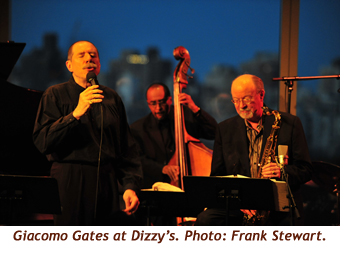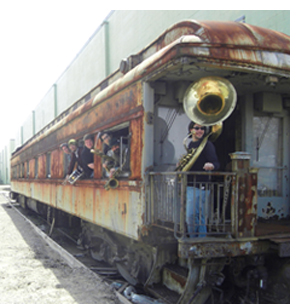 ?Creativity makes a leap, then looks to see where it is.?
?Creativity makes a leap, then looks to see where it is.?
Mason Cooley
Billy Martin is a percussionist, filmmaker, music producer, composer, sculptor, visual artist, and carpenter and is part of the groundbreaking jazz trio Martin, Medeski & Wood. His latest musical production (due out this month) is Road to Jajouka, a remix tribute to Morocco’s Master Musicians of Jajouka (see Voice review here). Recently he took the time for a conversation with Wanda Waterman about his ?innocent? approach to artistic creation, the importance of sincerity, and his first major film score. This is the conclusion of a two-part feature (see the first part here).
?They Just Happened?
Billy Martin continues to explain his views on the importance of ?unguarded expression? in creativity: ?To be honest, most of the best things I’ve done or collaborated on were not meticulously planned out?they just happened.
Everything I do, from performing to composing to visual art, is done that way.?
So how does ?unguarded expression? work out in practice? ?If I’m working on a piece of visual art, for example, I just start with a line or a colour. That’s the first action, and then something else comes from that. It starts taking shape and I start following it and shaping it.
?The same thing with music: I’ll make a sound and then I’ll answer that sound with another sound. I call it a ?string of phrases.?
?I work with student musicians to help them build their vocabulary in this way. Even in conversations like this one, you say one thing, you leave a space, and you say something else. You just string along and add to each phrase. The phrases either complement or contrast each other.
?When I compose I just sit at the piano and put my fingers on the keys without any idea what chord I’m playing or what It’s going to be. Then I’ll move my fingers to another place. I’m developing a kind of language just by moving my fingers around and using my ears. After a while a pattern emerges.
?I always try to maintain that innocent approach. It’s a way of being honest with yourself and your audience, that this is who you are and You’re giving it your all. It’s the same thing for a writer or anybody who’s a performing artist. It’s all performance art for me. You make an action and you follow it, whether It’s erasing or adding or editing?It’s performance.?
In My Solitude . . .
Billy cites the guarding of sufficient parcels of time and space as a necessary condition for the creative life.
?Sometimes domestic distractions add to the creative experience,? he remarks, ?but there are so many things happening in our lives that we really have to make sure that we have the space and the solitude to let projects take shape. You need the time to be able to take chances and make mistakes.?
Another important consideration is his relationship to his physical environment. ?If I’m drumming, for example, my relationship to my instrument?how the instrument sounds, how it resonates?is important. All instruments have a personality. And then there’s the room You’re in?smells, acoustics, the sounds around you, vibrations . . . are all going to influence your playing and output.?
Next Steps
?My next project is the score for a Hungarian film called Mirage. It’s basically a western that takes place in Hungary, about a soccer player who defects from the team because It’s a fixed game.
?He’s gotta get out of town, so he ends up in the Puszta, which is an outlands region of Hungary. It’s actually a very beautiful area with lots of farmland and now there’s a protected nature reserve there, but when communism fell a lot of people quickly became farm lords and kept people in forced captivity to work the farms. This soccer player ends up on one of these work farms.
?There’s actually a lot of humour in it. I’m really excited to be working with this director and also because It’s the first major film for me as sole composer. There’ll be an African feel along with the chamber music that I write.
?That’s my next major project, but I have so many other things going on!?


